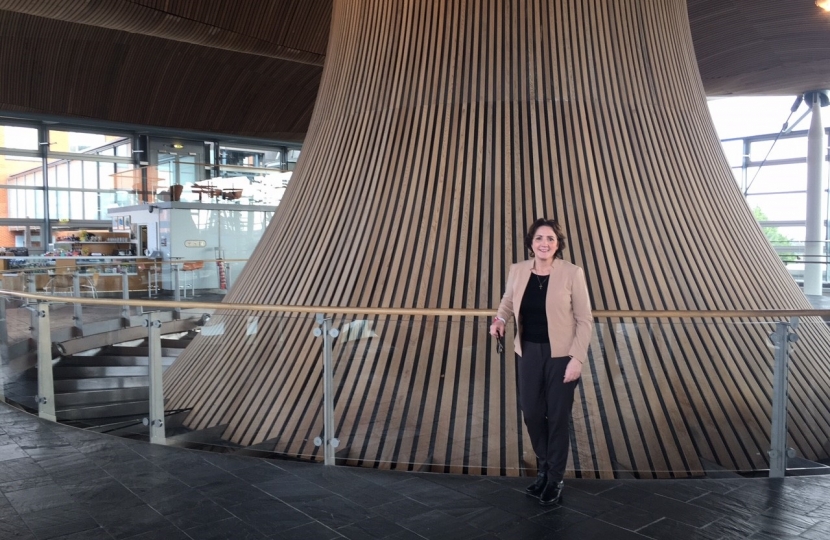
Janet:
I'd like to thank you for the statement here today. Around 29 per cent of the population report feeling socially lonely, 91,000 people feel consistently lonely, and the situation is at its worst for our older people. Over half of the people aged 60 to 74, and just under half of people over the age of 75, report feeling lonely. That's pretty sad, really, isn't it? Loneliness is associated with sleep problems, abnormal stress response, high blood pressure, poor quality of life, frailty, depression and increased risk of heart attacks, strokes, depression and dementia. In fact, Age UK has reported that loneliness can be as harmful to our health as smoking 15 cigarettes a day.
Now, as the older people's commissioner noted in the 'State of the Nation' report, Wales is falling behind other parts of the UK. The UK Government introduced a Minister for loneliness in January 2018. Scotland launched its loneliness strategy in December 2018. And, whilst welcoming the publication of the strategy today, I would appreciate just a reason, really, why there was such a delay on the one here in Wales.
I would like to note, though, that I do agree with you that the strategy is just the start. The British Red Cross estimates that each older person who requires services as a result of loneliness and isolation could cost £12,000 per person over the next 15 years. Therefore, I welcome the fact that the strategy will be supported by a £1.4 million loneliness and social isolation fund, and a new single advice fund of £8.4 million.
One question that I do have for you, Minister, and that is: we know that social isolation is helped by people being able to be mobile, to be able to catch a bus, go off to see shops in another town, go off to see their doctor, and the community bus service is really integral, yet, in Wales, we've seen so many of our community bus services actually withdrawn, so I wondered what you are doing to work with the Minister and Deputy to see how we can actually just enforce the fact that, really, taking something away like that is hardly feeding into the prevention and intervention agenda. It's foolhardy and it's not a cost-worthy initiative. What steps will you take to ensure that the new, innovative approaches you will be investing in have strong evidence to ensure that they succeed?
I do agree with the four priorities, but I have some questions about the key commitments. Priority 3, people need a health and social care system that provides well-being and community engagement: we only have to look at my own health board to see how, in some respects—. I know, people coming in through the door of my office, it is often they who feel very badly let down by the health service, and sometimes, the integration in health and social care that was a fundamental part of the social care and well-being Act that we all sat through scrutinising in 2014, which came in 2016—. We still have lots of concerns in the community about the lack of join-up, especially when somebody needs to leave hospital and they need a discharge; quite often, it can take weeks for that actual referral to be made so that people can go home and not be in hospital.
Two, will your strategy look at making more finance available to help deal with the restrictions on domiciliary care visits to enable more time for interactions between carers and housebound clients? I was pleased to see priority 3 highlight the Making Every Contact Count initiative. The Welsh NHS Confederation has written to me stating their belief that more work can be done around that particular agenda. I agree, and the respondents to your consultation highlighted that further work to build the capacity of health professionals to understand the trigger points and the effective support available should be a key priority.
Another question: in addition to exploring the potential for developing specific training, what clear actions can you outline today that will help empower health services and local authority staff to recognise the role that they have in supporting residents making positive changes to their physical and mental health and well-being? As you know, you've rightly pointed out previously that younger people are very likely to report feeling lonely. Your consultation highlighted that many feel that schools have a key role to play. This has fed into the strategy before us today, including priorities 1 and 4.
Calls have also been made, though, for pastoral sessions to be introduced into the school curriculum concentrating on loneliness and social isolation. Having studied the health and well-being area of learning in the curriculum, I believe that schools could consider taking steps to help tackle loneliness. What steps will you be taking to ensure that pastoral sessions focused on loneliness and social isolation are undertaken by every school?
Finally, you are right that a cross-Government approach is needed, and I would like to think, and you certainly have my support, that it should be a cross-party initiative. I am concerned that other portfolios may not be feeding into the agenda as much as you are. You will be establishing an advisory group to oversee the implementation of the strategy, so I wonder whether you have considered asking your Welsh Government colleagues to consult the group on every relevant legislative proposal that is presented to this Assembly, because, quite often, those legislative proposals, actually, whilst doing good in some parts, can impact negatively on other areas. So, what I'm looking for is more joined-up thinking between Welsh Government Ministers as regards this particular strategy. Thank you.

